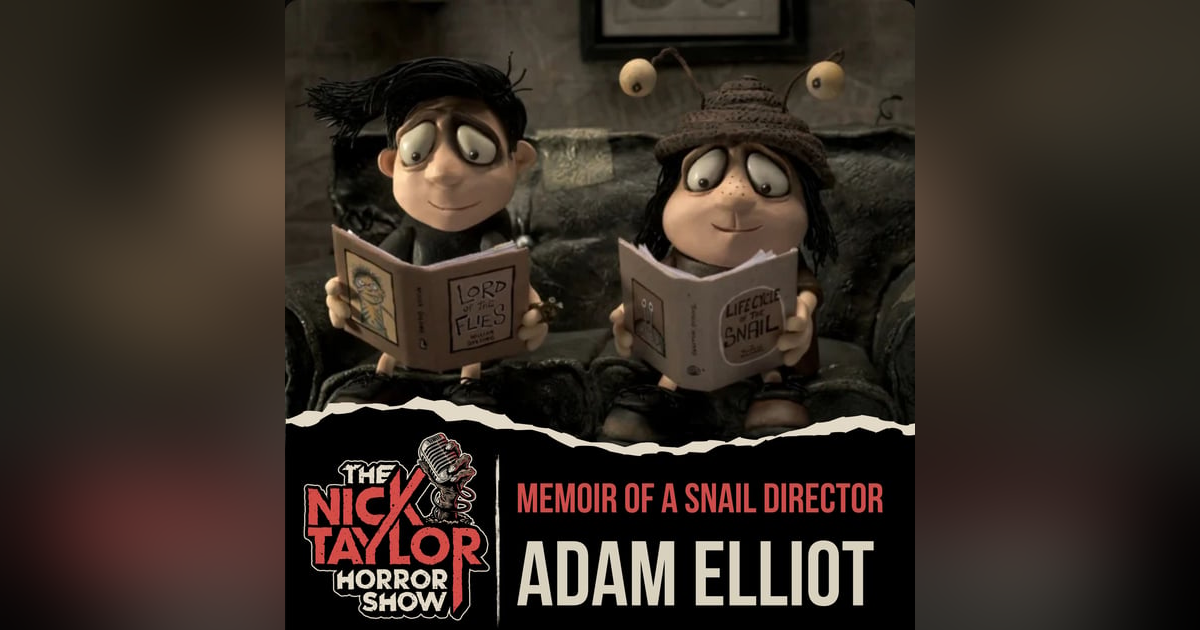MEMOIR OF A SNAIL Director, Adam Elliot

Today we’re joined by Academy Award-winning filmmaker Adam Elliot. Adam is Known for his painstakingly handcrafted stop-motion films like Mary and Max, and the shorts Harvie Krumpet, which won an Oscar, and Ernie Biscuit.
Today Adam shares the emotional and artistic journey behind his latest film, Memoir of a Snail—a deeply personal, darkly whimsical tale about a young girl named Grace and her struggles with isolation and self-discovery.
Memoir of a Snail—is nominated for Best Animated Feature at the Academy Awards and as much as I loved Flow and The Wild Robot, I’d love to see this movie take home the gold. One thing that struck me when I was watching this is that AI doesn’t stand a chance against work like this—the work is painstakingly personal, soulful, and filled with human touch and it’s authentic movies like these that we need to rally behind.
I cannot say enough good things about this movie, it made me laugh, it made me cry and I found it both entertaining and deeply moving. So all of you Academy voters, make sure to see it before the big day.
In today’s episode, Adam reveals the meticulous process behind crafting his stop-motion films, the challenges of writing deeply human stories, and why he insists on using entirely practical techniques in an age of CGI.
Here are some key takeaways from this conversation with Adam Elliot.
1. Celebrate Imperfections
Adam’s aesthetic stems from a physiological tremor that makes drawing straight lines difficult for him. By embracing his imperfections, he’s developed a signature style he calls “chunky wonky.” He encourages artists to celebrate their flaws, both in themselves and their work, as it adds authenticity and charm.
2. Embrace Originality by Looking Inward
Adam emphasized the importance of creating work that is uniquely your own. Drawing inspiration from his family, personal history, and everyday people, he crafts deeply human stories. For emerging filmmakers, he advises focusing less on homage and more on introspection to find your unique voice.
For filmmakers searching for their own voice, Adam suggests taking a step back from external influences. Instead of asking, “What kind of films do I want to make?” he advises asking, “What stories do only I have to tell?” He believes that everyone has unique experiences that can be shaped into compelling narratives—whether it’s an unusual upbringing, a family quirk, or an unforgettable encounter.
At the heart of originality is authenticity. Audiences connect most with stories that feel honest and deeply personal. Adam’s advice: don’t chase trends or worry about what’s marketable—dig into your own life and embrace the details that make you, you.
3. Art Takes Time
Adam’s writing process is unconventional—he starts with the details first, such as small quirks and objects (e.g., John Denver music, guinea pigs), and then pieces together the story and structure later. He went through 16 drafts of the script over three years, emphasizing the importance of patience, meticulous research, and revision. Memoir of a Snail took eight years to complete due to Adam’s dedication to every stage of production—from scriptwriting to crafting the characters and sets. His meticulous attention to detail is a reminder that meaningful work often requires patience and persistence, but the results can be amazing.
4. Balancing Comedy and Tragedy Engages Audiences
Adam’s films strike a delicate balance between humor and heartbreak, ensuring that audiences experience an emotional journey without being overwhelmed by darkness. He believes that life itself is a mix of light and dark, and his goal as a filmmaker is to capture that contrast in an authentic way. If a film leans too bleak, it risks leaving audiences emotionally drained; if it’s too light, it may lack depth and resonance. But when comedy and tragedy are carefully intertwined, they enhance each other—making the sad moments hit harder and the comedic ones feel like a welcome relief.
Adam believes that without darkness, light has no meaning, and vice versa. His characters face real struggles, yet he never leaves the audience completely lost in despair. There’s always a moment of levity, a touch of human absurdity, or a small triumph that keeps the emotional weight from becoming overwhelming.
Don’t be afraid to mix tones. Comedy doesn’t dilute drama—it can strengthen it. If you take your audience on a journey through life’s darkest moments, give them reasons to smile along the way. This balance not only makes a film more engaging but also ensures its emotional impact lingers long after the credits roll.
Show Notes
Films Discussed
- Memoir of a Snail
- Mary and Max
- The Nightmare Before Christmas
- Coraline
- Thelma
- Beetlejuice 2
Filmmakers Referenced
- Guillermo del Toro (Pinocchio)
- Wes Anderson (Fantastic Mr. Fox, Isle of Dogs)
- Tim Burton (The Corpse Bride, Beetlejuice)
- David Lynch
- Peter Greenaway
Follow Adam Elliot at:
- IMBd: https://www.imdb.com/name/nm0254178/
- X (Tweeter): https://x.com/AdamElliot2
- Instagram: https://www.instagram.com/adam_elliot_clay/
- Website: https://www.adamelliot.au/







